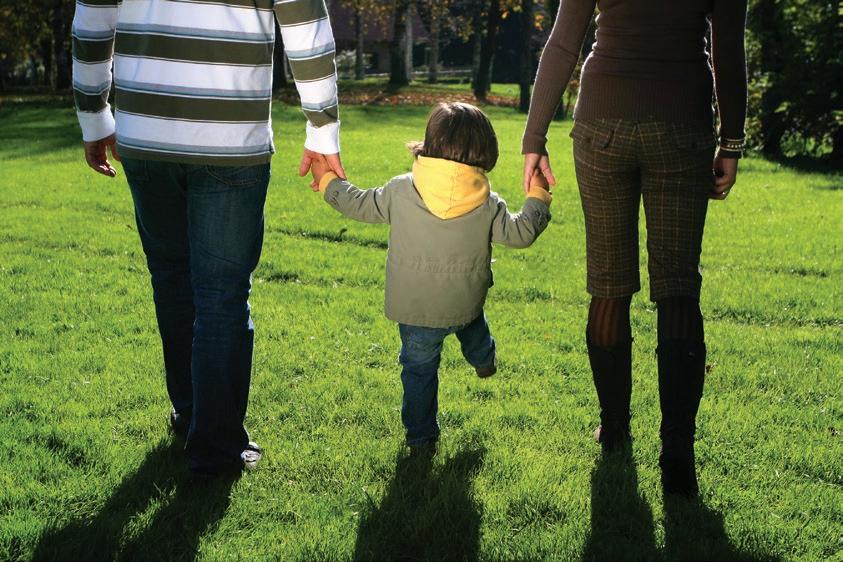
7 minute read
12. Most common questions
How long does it take from being diagnosed to starting treatment?
Once you have seen the rheumatology doctor, they are likely to make a management plan which often includes medication and advice about keeping active. The doctor and nurse specialist will talk you through the medication, dosage and how to take it. There is a lot of support available to help you at this time, visit www.arthritisireland.ie or call the Arthritis Ireland Helpline on 1890 252 846 or 01 6618188. What are the risks of taking the medication?
Advertisement
Your consultant or nurse specialist is in the best position to answer this question in relation to your child; they will tailor treatment according to your child’s condition, age, likes and dislikes and any other conditions.
Why do I have to keep giving the medicine?
Many of the medications used to manage JIA are long-term medications, therefore they are normally taken for 2-3 years, or sometimes longer. The aim is for your child to be in remission (no active arthritis) and it is usual to keep taking the medications, so that the JIA stays away and to enable your child to keep doing all their normal activities. Medications are given to reduce stiffness and pain and to prevent potential joint damage from occurring. It is recognised that children sometimes get fed up of taking medications or refuse them and if this occurs it’s important to talk openly with your doctor or nurse, so you can work out the best treatment plan together.
What’s causing the stiffness or pain?
JIA is caused by the immune system getting confused and attacking the joint lining, creating extra fluid that causes swelling and often limits the movement of the affected joint. This causes stiffness and pain that is typically worse in the mornings or after periods of inactivity (e.g. sleeping or a long car journey). Children, especially young ones, will not always complain of pain, but a sign of active JIA may be limping in the morning because of an affected knee. The stiffness caused by arthritis normally eases off once the child or young person gets moving, so keeping active is really important.
What do I do when he/she is in pain?
If your child is very young, try using their favourite toy to help them communicate where the pain is. Think about what your child likes that might distract them from the pain, a game with you or warm bath; a heated wheat bag or cold compress wrapped in a tea towel and placed on the painful area. Ultimately you know your child better than anyone, if you think it is necessary, you could also take them to your GP or A&E if you are worried.
Preparing for procedures (possibly painful)
To reduce possible upset brought on by the thought of a painful procedure like an infusion or injection, it is important to prepare your child for any likely anxiety by explaining briefly and truthfully, in age appropriate language what the procedure involves. It is best to avoid statements like ‘this is going to be painful’ or ‘it’s going to hurt’. It is recommended to describe the probable feelings associated with the procedure; for example, it may sting, pinch, tingle, burn or throb etc. depending on the situation. Allowing the child to play nurse/doctor and patient where the child pretends that they are making teddy or dolly better by using some medical supplies (eg. syringes, medicine spoons etc.) may also reduce some of the distress associated with procedures.
Will my child’s JIA ever go away?
A number of children and young people do go into remission (there is no active disease) at some point and don’t necessarily carry the disease forward into adulthood and the arthritis may go and then come back after a long period. The healthcare team’s focus and priority is to get your child into remission (on or off medication), so they can remain active, leading a normal life. In the last 15 years, the medication and treatment for JIA has advanced, with greater understanding about how to manage the disease and more access to very effective medications. This means children and young people’s outcomes are positive and the possibility of impairment has dramatically reduced. Get to know all the team members looking after your child. Ask all the questions you need to and together you will achieve the best chance of a positive outcome.
What’s the best way I can support my child now?
It is normal to feel angry and frustrated and possibly a little scared when your child has been diagnosed with JIA. If you are feeling overwhelmed, talk things through with trusted friends and loved ones or someone in the rheumatology team. Try to make sure you keep every appointment with a health professional and have questions ready to ask while you are there – remember no question is a silly question. Keeping a diary, especially in the early stages, can be helpful to you and the health professional team as it’s not always easy to try and remember everything that’s happened or on which days symptoms may have been worse for example. Ensure you fully understand how to use the medication most effectively, and what is the correct dose for your child’s age and weight. Get up to speed as quickly as you can on the importance of exercise, what’s best for their condition, how to make sure your child is pacing (not overdoing it) themselves etc. Speak to the specialist nurse and physio about what is most appropriate for your son or daughter.

Your child may have a long-term condition, but they still need to respect you, the household and other members of the family. Although sometimes easier said than done, listen to them, always try to communicate in a calm way and try to be mindful of what you and your child need. It’s easy to pay less attention to other children/siblings when you have a son or daughter with a disease like JIA as you may feel they need more attention and support. However, this can cause disruption so trying to keep life as normal as possible for the whole family can help.
Who knows arthritis better than those who live with it?
Arthritis Ireland’s JIA Mentors are adults who themselves either have or have had juvenile arthritis and can provide you and your family with valuable insight and support. They can pass on the benefit of their experiences with arthritis, helping you to better understand your condition and its effect on your life.
A JIA Mentor is only a phone call or email away. Call the Arthritis Ireland Helpline on Lo Call 1890 252 846, 01-6618188 or email info@arthritisireland.ie for more information.
Is it my fault?
There is no fault involved. No-one can really pin-point how, when or why children and young people get JIA – it’s not a preventable disease. Worrying and blaming yourself is emotionally and physically draining. It’s hard, but instead of having unproductive thoughts focus on your family and moving forward with JIA in the best and most positive way possible.
What should I tell the nurse or consultant at future appointments?
It’s a good idea to describe what the best day is like and what the worst day is like. What your child can do and what he/she can no longer do. You should also tell the nurse or consultant about any concerns you may have about giving the medication or any side effects your child may be experiencing. Every meeting with a healthcare professional is an opportunity for you and your child to learn more about JIA, how to manage it well and to raise concerns of any nature that you may have.
What should I tell the crèche/school?
After receiving a diagnosis, you should inform the educational establishment that your child attends. It is unlikely that they will have much, if any, knowledge of JIA, so think about what they would need to know to make your child’s time there easier and what support they should provide. The specialist nurse, or if you have access to an occupational therapist, is probably the best person to help with some key points and they might include information about morning stiffness, tiredness, pain and medication, exercise etc.


